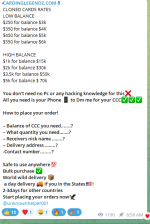credit card dumps 2023 refers to the stolen data in the magnetic stripe of a credit cards commonly used by Carders and cyber criminals to clone/counterfeit credit cards and make unauthorized purchases.
This data includes the card holder’s name, card number, expiration date, billing address and phone number. Using these pieces of information, criminals can create a physical copy of an active credit card and charge various unauthorized financial transactions on it.

This type of crime has existed for decades, but it has seen wider public awareness in recent years due to the rising prevalence of credit card forgeries, identity theft, and other types of cyber crime.
TO BUY CLONES CLICK HERE

There are very many ways in which a credit card dump may occur.
skimming. In which an illegal card reader affixes to the mouth of a real card reader to copy credit card data. Automated teller machine (ATM) and gas station pump are prime for affixing credit card skimmers.
Fraudsters later use these dumps to clone crefit cards which can later be used to make unauthorized purchases online or can be sold to other buyers.

There are various incidents in which hackers have managed to compromise vast amounts of credit card data from unsuspecting customers. In May 2019, for example, the popular Australian graphic design website, Canva, was breached by hackers, with nearly 140 million user accounts compromised.
In addition to personal information such as names, usernames, and email addresses, the hackers also managed to access users’ credit card information.
Another notable incident occurred in October 2013, when Adobe (ADBE) lost nearly 3 million customer credit card records in a large scale attack by hackers. The breach was part of a larger effort in which data from over 150 million users was also stolen. The company ultimately reached a roughly $1 million settlement with its customers over the incident.
Possible signs of credit card fraud.
If you believe your credit card information has been compromised, contact the credit card company immediately to cancel your credit card and outline unauthorized charges. Numerous credit card companies follow a “zero liability” policy, meaning you will not be held liable for unauthorized charges.
This data includes the card holder’s name, card number, expiration date, billing address and phone number. Using these pieces of information, criminals can create a physical copy of an active credit card and charge various unauthorized financial transactions on it.

This type of crime has existed for decades, but it has seen wider public awareness in recent years due to the rising prevalence of credit card forgeries, identity theft, and other types of cyber crime.
TO BUY CLONES CLICK HERE

There are very many ways in which a credit card dump may occur.
skimming. In which an illegal card reader affixes to the mouth of a real card reader to copy credit card data. Automated teller machine (ATM) and gas station pump are prime for affixing credit card skimmers.
- Malware-infected point of sales (POS) system.
- Phishing websites
- Data breach
Fraudsters later use these dumps to clone crefit cards which can later be used to make unauthorized purchases online or can be sold to other buyers.

There are various incidents in which hackers have managed to compromise vast amounts of credit card data from unsuspecting customers. In May 2019, for example, the popular Australian graphic design website, Canva, was breached by hackers, with nearly 140 million user accounts compromised.
In addition to personal information such as names, usernames, and email addresses, the hackers also managed to access users’ credit card information.
Another notable incident occurred in October 2013, when Adobe (ADBE) lost nearly 3 million customer credit card records in a large scale attack by hackers. The breach was part of a larger effort in which data from over 150 million users was also stolen. The company ultimately reached a roughly $1 million settlement with its customers over the incident.
Possible signs of credit card fraud.
- Seeing unnecessary charges on your credit card.
- Suddenly being locked out of your credit card.
- Unknown inquiries from collection agencies.
If you believe your credit card information has been compromised, contact the credit card company immediately to cancel your credit card and outline unauthorized charges. Numerous credit card companies follow a “zero liability” policy, meaning you will not be held liable for unauthorized charges.
















